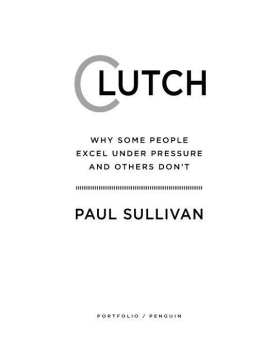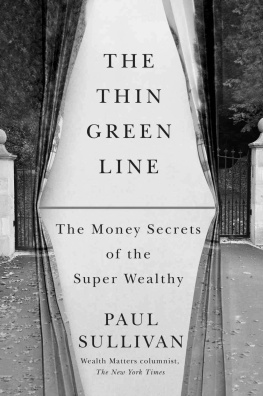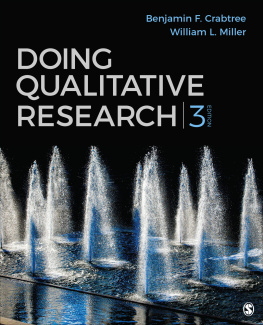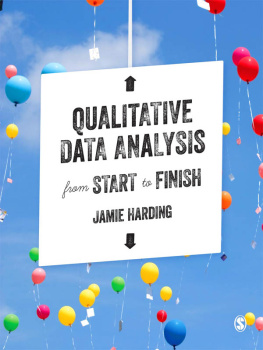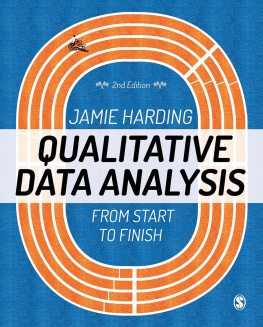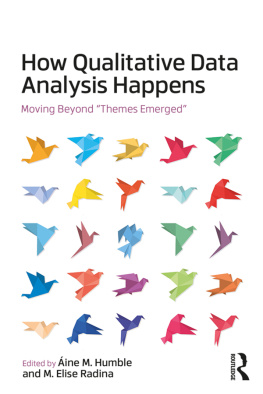Qualitative Data Analysis
Using a Dialogical Approach
SAGE has been part of the global academic community since 1965, supporting high quality research and learning that transforms society and our understanding of individuals, groups, and cultures. SAGE is the independent, innovative, natural home for authors, editors and societies who share our commitment and passion for the social sciences.
Find out more at: www.sagepublications.com
Qualitative Data Analysis
Using a Dialogical Approach
Paul Sullivan
Paul Sullivan 2012
First published 2012
Apart from any fair dealing for the purposes of research or private study, or criticism or review, as permitted under the Copyright, Designs and Patents Act, 1988, this publication may be reproduced, stored or transmitted in any form, or by any means, only with the prior permission in writing of the publishers, or in the case of reprographic reproduction, in accordance with the terms of licences issued by the Copyright Licensing Agency. Enquiries concerning reproduction outside those terms should be sent to the publishers.
SAGE Publications Ltd
1 Olivers Yard
55 City Road
London EC1Y 1SP
SAGE Publications Inc.
2455 Teller Road
Thousand Oaks, California 91320
SAGE Publications India Pvt Ltd
B 1/I 1 Mohan Cooperative Industrial Area
Mathura Road
New Delhi 110 044
SAGE Publications Asia-Pacific Pte Ltd
33 Pekin Street #02-01
Far East Square
Singapore 048763
Library of Congress Control Number: 2011925497
British Library Cataloguing in Publication data
A catalogue record for this book is available from the British Library
ISBN 978-1-84920-609-9
ISBN 978-1-84920-610-5 (pbk)
Typeset by C&M Digitals (P) Ltd, Chennai, India
Printed and bound by CPI Group (UK) Ltd, Croydon, CRO 4YY
Printed on paper from sustainable resources
For my parents, Pat and Carol
BRIEF CONTENTS
CONTENTS
ABOUT THE AUTHOR
Dr Paul Sullivan lectures in psychology at the University of Bradford. His research is concerned with the significance of dialogue in understanding interpersonal as well as intrapersonal relationships and its applications for doing qualitative psychology. He is the 2009 winner of the Qualitative Methods in Psychology Section Prize for Outstanding Early Career Scholar.
PREFACE
This book is intended for a broad range of academics, practitioners and students interested in the turn to dialogue in the social sciences and how it may be used as a qualitative methodology. A dialogical analysis, inspired by the philosopher and literary critic, Mikhail Bakhtin (18951975) is particularly appropriate for students of subjectivity; those who are interested in how the thoughts, feelings and emotions of the author intone language and are open to analysis. The author is very much alive and well in this kind of approach but is interpreted as a searching author, seeking to give shape to others as well as to self through language. Discourse, rhetoric and ambivalent experience are united under a view of dialogue that is primarily aesthetic in spirit.
A dialogical approach to data analysis is worked out, in part, through engaging seriously with existing qualitative methodologies. These include grounded theory, narrative analysis, phenomenological analysis and discourse analysis. These qualitative methodologies are approached in terms of their practices rather than theory alone. So, for instance, their relevance to dialogue is examined from the point of view of the attitude they bring to the text (trust and suspicion), how they deal with subjectivity, the guidelines they propose (bureaucratic and charismatic) and the view of time and space that they suggest. Against the light of these practices, it is possible to assess a dialogical approach to the text.
Great effort has been expended in trying to make this a readable and usable book. Overly technical terms and convoluted phraseology is avoided as far as possible. Summary tables at the end of most sections are included for easy navigation. Case studies and examples are regularly examined as a means of testing what a dialogical approach can bring to the table. A further reading list is provided at the end of every chapter.
I hope that these efforts pay off for the reader and that a dialogue with the methodology will be rewarding.
Paul Sullivan
December 2010
ACKNOWLEDGEMENTS
I would like to thank the University of Bradford for permitting me to take study leave to complete this book.
I have been incredibly fortunate with the quality of comment and support I have received at every single stage of the writing. Without the enthusiasm and support of expert friends, this book would not have been written. John McCarthy from University College Cork has provided constructive and challenging suggestions. I am very grateful to John for his enthusiasm, remarkable insight and capacity to push forward the frontiers of ideas and the horizon of idea-heroes. Many heartfelt thanks also to Anna Madill from the University of Leeds. Anna has provided numerous constructive, thoughtful, challenging comments and has opened up exciting new worlds of possibility for engaging with the text. I also would like to extend a very big thank you to Ian Burkitt at the University of Bradford. Ian, with characteristic generosity and intellectual curiosity, has discussed ideas and given very helpful comments on chapters from the book.
There are others who have also made important contributions to this book. Patrick Brindle and David Hodge from Sage have also been very generous with their time and critical feedback. Without Patrick and David reminding me of the reader, the book would be lost. Many thanks also to Lucy Goldsmith and Timothy Gomersall for their valuable comments and dialogue with the work.
Finally, I have been engaged in an intense dialogue with myself and the hidden addressees who help shape the book. Many thanks to my wife, Val, for her support, good humour and energy in rescuing me from the worst excesses of this dialogue and creating another world outside this particular text.
1
INTRODUCING DIALOGUE TO QUALITATIVE ANALYSIS
In the busy marketplace of qualitative methodologies, this book sets out the stall for a dialogical approach to qualitative analysis. A dialogical approach provides tools for the methodological analysis of subjectivity in qualitative data. Subjectivity is theorised as changing and responsive to others. This will be useful for those who have collected interviews or done focus groups or selected material for analysis and are wondering where to go next amidst a bewildering array of qualitative methods. If the data is concerned with subjectivity, then it may be worthwhile shepherding it into the arms of a dialogical methodology.





